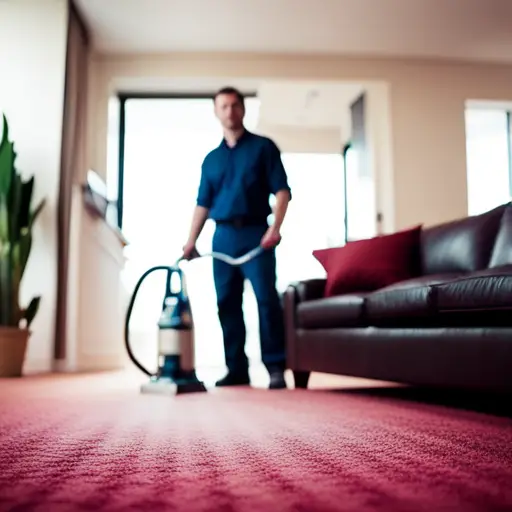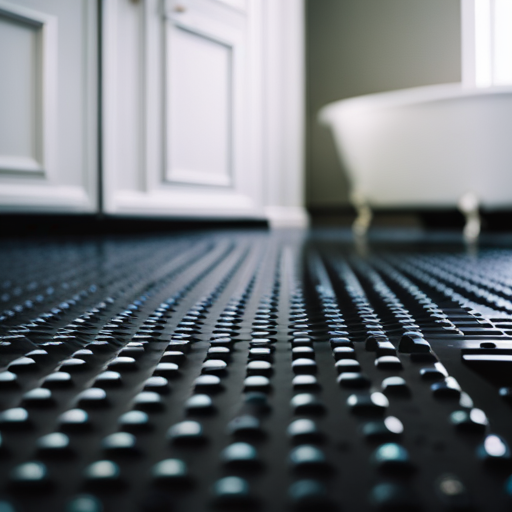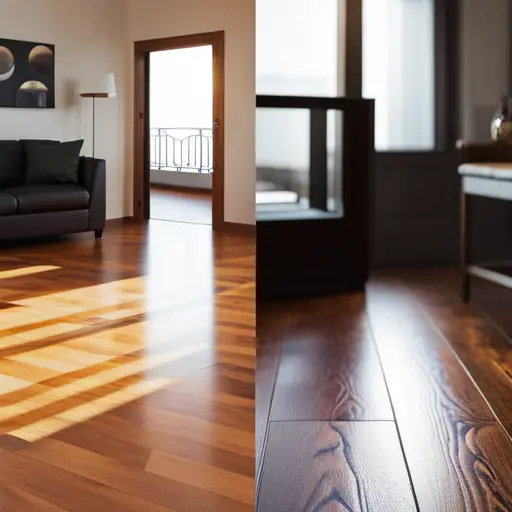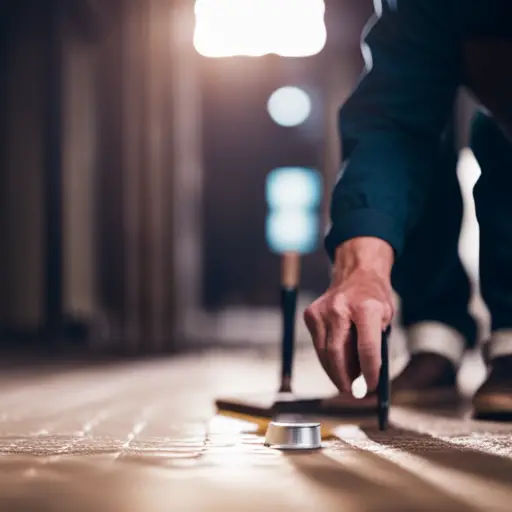The Benefits of Sealing Stone Floors

Discover the transformative power of sealing stone floors, a game-changing practice that promises to revolutionize the way you care for your surfaces.
From enhancing durability to preserving natural beauty, the benefits of sealing stone floors are as vast as they are impactful.
In this article, we delve into the myriad advantages of this essential maintenance technique, shedding light on how it can elevate the longevity and aesthetic appeal of your stone surfaces.
Enhanced Durability
Sealing stone floors enhances their durability, prolonging their lifespan and reducing the need for frequent maintenance. Once sealed, stone floors become more resistant to scratches, stains, and other forms of damage, making them easier to clean and maintain. This brings about significant cost savings in the long run as it reduces the frequency of professional deep cleaning and repairs.
To maintain the sealed stone floors, regular sweeping or vacuuming is essential to remove dirt and debris that can cause abrasions. Additionally, using a neutral pH cleaner and a damp mop for regular cleaning helps to preserve the sealant and the natural beauty of the stone. It is important to avoid harsh chemical cleaners or acidic substances as they can degrade the sealant and damage the stone.
By following these maintenance tips, the sealed stone floors can maintain their durability and aesthetics for a prolonged period, ensuring cost savings and a reduced need for extensive maintenance.
This enhanced durability also extends to stain protection, which is another crucial benefit of sealing stone floors.
Stain Protection
Stone floor sealing provides enhanced stain protection, preserving the natural beauty and longevity of the flooring material. The sealing process creates a barrier that helps prevent spills and stains from penetrating the stone surface, making it easier to clean and maintain.
Here are some cleaning techniques and maintenance tips to maximize the stain protection benefits:
-
Regular Sweeping and Vacuuming: Removing dirt and debris promptly can prevent them from grinding into the stone and causing stains. Use a soft-bristled broom or vacuum with a brush attachment to avoid scratching the surface.
-
Prompt Spill Cleanup: Wipe up spills immediately with a soft cloth to prevent them from seeping into the stone and causing stains. Blot the spill instead of rubbing to avoid spreading the liquid.
-
Appropriate Cleaning Products: Use pH-neutral stone cleaners and avoid harsh chemicals that can damage the sealant and the stone. Test any new cleaning product on a small, inconspicuous area before using it on the entire floor.
Scratch Resistance
When it comes to scratch resistance, sealing stone floors offers significant benefits.
The protective sealant acts as a barrier against potential damage, ensuring the floor remains durable and long-lasting.
Additionally, it helps preserve the natural appearance of the stone, keeping it looking pristine for longer periods.
Protects Against Damage
Protecting stone floors against damage is essential for maintaining their appearance and longevity. Sealing stone floors offers significant benefits in terms of damage prevention and maintenance.
Here’s how sealing protects against damage:
-
Scratch Resistance: Sealed stone floors are more resistant to scratches from foot traffic, furniture, and other objects, reducing the risk of unsightly damage and preserving the floor’s beauty.
-
Stain Resistance: Sealing creates a protective barrier that makes it harder for spills and stains to penetrate the stone, making cleaning and maintenance easier and preventing long-term damage.
-
Enhanced Durability: Sealing strengthens the stone, reducing the likelihood of chips, cracks, and other forms of damage, which ultimately extends the lifespan of the floor and minimizes the need for costly repairs.
Enhances Durability and Longevity
Sealing stone floors enhances their scratch resistance, ensuring prolonged durability and longevity. By applying a sealant, the stone floor gains increased strength and improved resilience against scratches and wear. This protective barrier acts as a shield, preventing abrasive particles from causing damage to the surface of the stone.
As a result, the sealed stone floor is better equipped to withstand heavy foot traffic, furniture movement, and other sources of potential abrasion. The enhanced scratch resistance provided by the sealant helps to maintain the aesthetic appeal of the stone floor, preserving its natural beauty for an extended period.
Additionally, the improved durability and longevity of the sealed stone floor contribute to cost savings by reducing the need for frequent repairs or replacements.
Preserves Natural Appearance
The application of a sealant on stone floors maintains their natural appearance and provides enhanced scratch resistance, ensuring the surface remains unblemished even with heavy use. This preservation of the stone’s natural aesthetics offers long-term benefits and surface protection, making it an ideal choice for high-traffic areas.
To ensure the continued preservation of the stone floors’ natural appearance and scratch resistance, consider the following maintenance tips:
- Regular cleaning with a pH-neutral stone cleaner
- Avoiding the use of harsh chemicals or abrasive cleaning tools
- Promptly wiping up spills to prevent staining
- Periodic resealing as recommended by the manufacturer
Water Damage Prevention
When it comes to maintaining stone floors, water damage prevention is crucial.
Sealing the stone helps to repel water and prevent stains, protecting the floor from potential damage.
Sealing Repels Water
Stone floor sealing provides effective water repellency, preventing potential water damage and maintaining the floor’s integrity. This surface protection is crucial for the maintenance and prevention of costly restoration due to water-related issues.
The benefits of sealing in terms of water repellency include:
- Prevention of Water Damage: Sealing creates a protective barrier, preventing water from seeping into the stone and causing damage.
- Maintenance of Floor Integrity: By repelling water, sealing helps maintain the structural integrity of the stone floor, prolonging its lifespan.
- Restoration Prevention: Sealing reduces the need for restoration work by preventing water-induced deterioration, saving time and money in the long run.
This effective water repellency provided by sealing seamlessly transitions into the subsequent section about how sealing protects against stains.
Protects Against Stains
Continuing from the previous subtopic, effective sealing of stone floors provides protection against stains, further safeguarding against water damage and preserving the floor’s quality.
Sealing forms a protective barrier that prevents liquids from penetrating the stone, thus reducing the likelihood of staining. This safeguarding effect also extends to preventing water damage, as the sealant helps to repel water, preventing it from seeping into the stone and causing damage over time.
To maintain the effectiveness of the sealant, it is crucial to employ proper cleaning techniques that are suitable for the specific type of stone and sealant used. Additionally, the sealing frequency should align with the manufacturer’s recommendations to ensure that the floor remains adequately protected against stains and water damage.
Regular maintenance and resealing as needed will help to uphold the floor’s quality and longevity.
Easy Maintenance
Maintaining stone floors becomes easier when they are properly sealed, reducing the need for frequent cleaning and preventing staining. This results in time-saving cleaning and effortless upkeep for homeowners and property managers.
The benefits of sealing stone floors include:
-
Reduced Cleaning Frequency: Sealing stone floors creates a protective barrier that repels dirt and spills, reducing the frequency of cleaning required to keep the floors looking pristine.
-
Stain Prevention: Sealed stone floors are less susceptible to staining, as the sealant acts as a shield against liquid penetration, making spills easier to clean and less likely to leave permanent marks.
-
Long-Term Protection: Sealing stone floors extends the lifespan of the flooring, reducing the need for costly repairs and replacements over time.
Natural Beauty Preservation
Preservation of the stone floor’s natural beauty is essential for creating a lasting and visually appealing environment. Implementing preservation methods is crucial to safeguard the aesthetic appeal of stone floors.
Sealing the stone floor with a protective sealant is one of the most effective preservation methods. This creates a barrier that prevents staining and etching, preserving the natural beauty of the stone. Additionally, regular cleaning and maintenance play a vital role in natural beauty preservation.
Surface protection through the use of sealants not only safeguards the stone floor from damage but also enhances its natural colors and patterns, ensuring that its beauty remains intact for years to come.
It is important to choose a sealant that is suitable for the specific type of stone to ensure maximum effectiveness. By investing in preservation methods and surface protection, the natural beauty of stone floors can be maintained, contributing to a visually appealing and enduring environment.
Longevity Extension
To extend the longevity of stone floors, proper sealing is essential. Stone floors are a long term investment, and maintaining their durability is crucial to ensure their lasting beauty and functionality. Proper sealing offers several benefits that contribute to the longevity of stone floors:
-
Protection from Wear and Tear: Sealing stone floors creates a protective barrier against daily wear and tear, preventing scratches, stains, and other forms of damage that can accumulate over time. This safeguards the structural integrity of the floors and reduces the need for frequent repairs.
-
Prevention of Moisture Damage: Sealing helps to prevent moisture from seeping into the stone, which can cause deterioration and weakening of the flooring material over time. By maintaining a moisture-resistant surface, the risk of long term damage is significantly reduced.
-
Reduction of Maintenance Costs: Investing in proper sealing upfront can lead to substantial savings in maintenance costs over the long term. Sealed stone floors are easier to clean and require less frequent maintenance, resulting in lower overall upkeep expenses. This makes sealing an economically sound decision for preserving the longevity and quality of stone floors.
Frequently Asked Questions
How Often Should Stone Floors Be Resealed to Maintain Their Benefits?
To maintain the benefits of stone floor sealing, resealing frequency depends on foot traffic and wear. Generally, a good rule of thumb is to reseal every 1-3 years. Using high-quality sealants can extend the duration between resealing.
Are There Different Types of Sealants for Different Types of Stone Floors?
Yes, there are different types of sealants for various stone floors. Each sealant is tailored to the specific properties of different stone types, ensuring optimal compatibility and protection. Understanding the nuances of each type is crucial for effective sealing.
Can Sealing Stone Floors Prevent Discoloration From Sunlight Exposure?
Yes, sealing stone floors can prevent fading caused by sunlight exposure. Different sealant types are available for various stone types, ensuring long-term maintenance. It is crucial to select the appropriate sealant for optimal protection.
Will Sealing Stone Floors Affect Their Natural Texture or Appearance?
Sealing stone floors can preserve their natural texture while enhancing their appearance. The process creates a protective barrier that doesn’t alter the stone’s inherent qualities. It prevents stains, moisture penetration, and wear, prolonging the floor’s life.
What Are the Potential Drawbacks or Risks of Sealing Stone Floors?
Sealing stone floors can pose potential risks such as trapping moisture and causing damage. Maintenance requirements may increase due to the need for regular resealing and specialized cleaning. Professional guidance is advisable for proper upkeep.
Conclusion
In conclusion, sealing stone floors offers enhanced durability, stain protection, scratch resistance, water damage prevention, easy maintenance, natural beauty preservation, and longevity extension.
For example, a hotel in a coastal area sealed its stone floors to protect against saltwater damage, resulting in a longer lifespan for the floors and reduced maintenance costs.
Sealing stone floors is a wise investment for both residential and commercial properties.

Rubin Everest, a seasoned expert in the world of flooring, brings a wealth of knowledge and passion to the surface. As the mind behind ebbow.com, Rubin is dedicated to sharing insights on the latest trends, innovative solutions, and expert advice in the realm of flooring. Whether you’re seeking practical tips for installation or design inspiration, Rubin Everest is your go-to source for all things flooring-related, making your journey to the perfect floor an informed and enjoyable experience.





